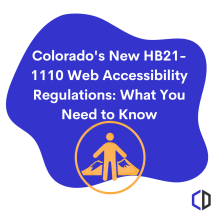
Colorado is leading the way in making the web more inclusive and accessible for all. With the new accessibility regulations outlined in House Bill HB21-1110 and its extension under HB24-1454, public entities must ensure their websites are fully accessible by July 1, 2025. These regulations are crucial because they help create an inclusive environment, ensuring that individuals with disabilities and impairments that would otherwise find web use difficult or impossible have equal access to digital content. Additionally, this bill creates a blueprint that can influence the private sector, paving the way for standardized accessibility in the future. This impacts not only compliance but also enhances user experience, improves SEO, and broadens your audience reach.
Let's Talk About Your Websites Accessability
Who Does House Bill 21-1110 Apply To?
- Public Entities
- Government Websites
- Educational Institutions
- Public Services
What Are Colorado's New Web Accessibility Regulations?
Colorado's regulations align with the Web Content Accessibility Guidelines (WCAG) 2.1, which provide a comprehensive set of standards for web accessibility. Most public-facing websites must be navigable for users with disabilities, including those using screen readers or keyboard navigation. This means accommodating a variety of disabilities by incorporating the following elements:
- Alt text for images: Ensures that visually impaired users can understand the content conveyed by images.
- Proper headings: Structured headings provide a clear hierarchy, making it easier for screen readers to navigate the page.
- Multimedia captions: Adds text captions for videos and other multimedia to support users with auditory impairments.
- Keyboard navigation: Allows users who cannot use a mouse to fully navigate your website using only a keyboard.
- Sufficient color contrast: Ensures text and visual elements are distinguishable for users with visual impairments.
These regulations apply specifically to public entities, emphasizing that web accessibility is a civil rights issue. Non-compliance can lead to significant fines, legal risks, and damage to your reputation. Under HB21-1110, public entities must provide reasonable accommodations and demonstrate ongoing progress toward removing digital barriers. Ensuring accessibility is not just about compliance—it is about providing a respectful and inclusive experience for all users. Our team understands these regulations thoroughly and can guide you through the process to ensure full compliance. We also stay informed about evolving regulations across the country, providing you with the foresight needed to maintain compliance as new laws are introduced.
Why This Matters for Your Business
Compliance not only helps avoid legal issues but also makes your site accessible to over 20% of Americans who have disabilities. For instance, companies that have improved their website accessibility have reported increased user satisfaction and broader customer reach. One such example is a retail business that saw a 15% increase in conversions after implementing accessibility features, which made their site easier to navigate for all users.
Accessible websites often see higher engagement, loyalty, and better SEO performance, which can help new customers find you. We have deep expertise in web accessibility, and our team can help you unlock the full potential of your digital presence while ensuring you stay compliant with the latest standards. We offer specialized services, including accessibility audits, development support, and ongoing maintenance, to ensure that all your accessibility needs are met effectively.
Steps to Make Your Website Accessible
- Audit Your Website: Conduct a comprehensive audit to identify areas that need improvement. Look for issues such as missing alt text, improper use of headings, insufficient color contrast, and inaccessible forms. This initial review will provide a roadmap for your accessibility efforts. We offer professional audit services to help identify these key areas quickly and accurately.
- Follow WCAG Guidelines: Adhere to WCAG 2.1 standards, which include a variety of practices to make your site accessible. These cover keyboard accessibility, providing text alternatives for non-text content, and ensuring your site’s layout is compatible with assistive technologies. We can implement these changes step-by-step, ensuring nothing is overlooked.
- Incorporate Accessibility Tools: Implement tools that help users navigate your website more effectively, such as compatibility with screen readers, ARIA labels, and visible accessibility widgets. Our expertise can help you select and integrate the right tools to meet these needs.
- Provide Training for Your Team: Ensure your content creators, developers, and designers are well-versed in accessibility practices. Regular training will help them create accessible content and maintain compliance as your site evolves. We offer training sessions to equip your team with the knowledge needed to maintain accessibility long-term.
- Ongoing Monitoring: Web accessibility isn’t a one-time fix—it requires ongoing attention. Use automated testing tools to regularly scan your website for issues, and incorporate manual testing by users with disabilities. We provide ongoing monitoring to help keep your site compliant.
- Get User Feedback: Encourage users to provide feedback on your website's accessibility. A simple feedback form where users can report issues helps identify problems quickly and demonstrates your commitment to an inclusive web experience. We can assist in setting up these feedback systems and analyzing the results to make continuous improvements.
We Can Help
Web accessibility can be complex, but our team is here to help. We specialize in audits, updates, and maintenance to ensure your website meets Colorado’s standards. We provide accessibility audits, development support, and ongoing compliance monitoring, using tools like automated scanners and regular training. Our knowledge of HB21-1110 allows us to guide public entities confidently.
Whether you need an audit, redesign help, or information on regulations, we’re ready to assist. Partner with us to stay compliant and improve user experience. Reach out today to see how we can help you make essential updates.
